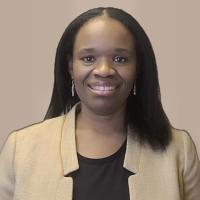Ebony Holliday, PhD, assistant director of Community Programs at Kennedy Krieger Institute’s Center for Autism Services, Science and Innovation (CASSI), talks about the various programs and services that can help autistic students — and their families — as they transition from one school age to the next, but in particular, into young adulthood once school and more formal services end.
This video appears in:
Transcript
Transition periods for autistic individuals. And whether it’s early childhood or looking at elementary school to middle school or at that high school age, it can be a difficult time. And I think it’s a difficult time not only for the individual, because again, change for some autistic individuals might be challenging to really navigate. So that could be just an internal difficulty, but also stress for the families or for the caregivers that may be there learning different systems. So the early childhood system, early intervention is a different system than, for example, at times the school system entering in at maybe entering in at three. It’s a little bit different. And then going from elementary school to middle school, the systems are somewhat different, although it’s all under that school platform. There’s different expectations, there’s different people. And then certainly that big change going from high school or going from that K through 12 arena or birth to 21, and then going into the adult world.
And so we’re hearing a lot from families. That is really a difficult transition at times to learn a completely different system in the adult world. What services are available, where to go with that. And certainly schools have built in transitions, especially for students who have IEPs or individualized education plans. So transition is something that’s built in there, but there’s always room for improvement. And so sometimes we know and we hear that transition plans maybe could start earlier or could be more comprehensive. So I feel like that’s always an area to kind of grow in. But I think one of the things as we think about transition is planning early is really thinking about, and it may even be several years before that actual transition has to take place. What is that new setting? What is that new environment that I or my child might be going to?
What does that look like? What skills might be necessary there? And how do we start working and building on that now? How do we start building a team around this person or around their family and their network? So when they actually make that transition or when they begin making that transition, they’ll have the support that they need. And so there are things, there are definitely many programs and community-based organizations that are out there to help transitions, for example, from secondary school looking at whether it’s college or looking to the world of work or just different types of day programs. So there are many options that are out there, but it’s really, I would say, learning and that individual or that caretaker or parent or family, making sure that they are well-educated in those resources as far as what is available or what they need to do to make sure that they have access to things that are in the community.
